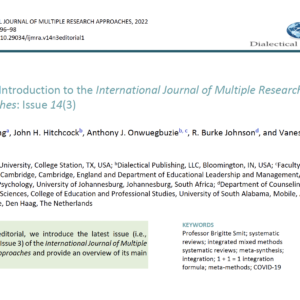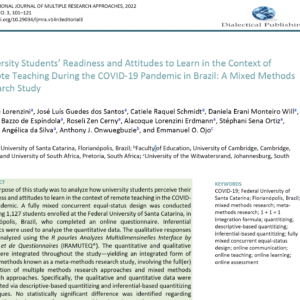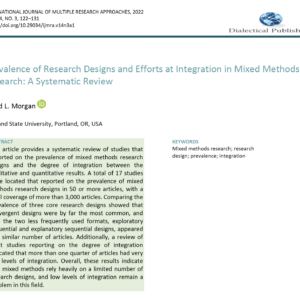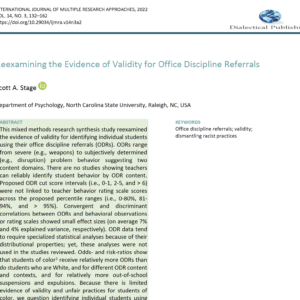“14(3). 04. Prevalence of Research Designs and Efforts at Integration in Mixed Methods Research: A Systematic Review” has been added to your cart.
View cart -

$0.00
Author Donggil Song(a), John H. Hitchcock(b), Anthony J. Onwuegbuzie(b, c), R. Burke Johnson(d), and Vanessa Scherman(e) (a) Texas A&M University, College Station, TX, USA; (b) Dialectical Publishing, LLC, Bloomington, IN, USA; (c) Faculty of Education, University of Cambridge, England and Department of Educational Leadership and Management/Department of Educational Psychology, University of Johannesburg, Johannesburg, South Africa;…
-

$0.00
Author Vanessa Scherman(a), Anthony J. Onwuegbuzie(b) (a) IB Global Centre, Den Haag, The Netherlands; (b) Dialectical Publishing, LLC, Bloomington, IN, USA; Faculty of Education, University of Cambridge, England and Department of Educational Leadership and Management/Department of Educational Psychology, University of Johannesburg, Johannesburg, South Africa Abstract In this editorial, we provide a tribute to Professor (Prof)…
-

$30.00
Author Elisiane Lorenzini(a), José Luís Guedes dos Santos(a), Catiele Raquel Schmidt(a), Daniela Erani Monteiro Will(a), Marina Bazzo de Espíndola(a), Roseli Zen Cerny(a), Alacoque Lorenzini Erdmann(a), Stéphani Sena Ortiz(a), Isadora Angélica da Silva(a), Anthony J. Onwuegbuzie(b), and Emmanuel O. Ojo(c) (a) Federal University of Santa Catarina, Florianópolis, Brazil; (b) Faculty of Education, University of Cambridge, Cambridge,…
-

$30.00
Author David L. Morgan Portland State University, Portland, OR, USA Abstract This article provides a systematic review of studies that reported on the prevalence of mixed methods research designs and the degree of integration between the qualitative and quantitative results. A total of 17 studies were located that reported on the prevalence of mixed…
-

$30.00
Author Scott A. Stage Department of Psychology, North Carolina State University, Raleigh, NC, USA Abstract This mixed methods research synthesis study reexamined the evidence of validity for identifying individual students using their office discipline referrals (ODRs). ODRs range from severe (e.g., weapons) to subjectively determined (e.g., disruption) problem behavior suggesting two content domains. There…




